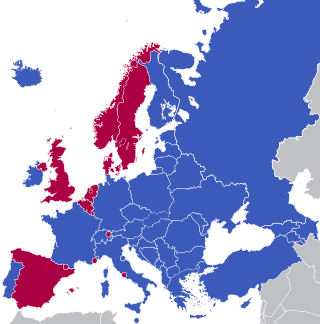
Constitutional monarchy, also known as limited monarchy, parliamentary monarchy or democratic monarchy, is a form of monarchy in which the monarch exercises their authority in accordance with a constitution and is not alone in making decisions. Constitutional monarchies differ from absolute monarchies in that they are bound to exercise powers and authorities within limits prescribed by an established legal framework. A constitutional monarch in a parliamentary democracy is a hereditary symbolic head of state who mainly performs representative and civic roles but does not exercise executive or policy-making power.
A head of state is the public persona of a sovereign state. The name given to the office of head of state depends on the country's form of government and any separation of powers; the powers of the office in each country range from being also the head of government to being little more than a ceremonial figurehead.
Republicanism in Australia is a movement to change Australia's system of government from a constitutional monarchy to a republic; presumably, a form of parliamentary republic that would replace the monarch of Australia with a non-royal Australian head of state. It is opposed to monarchism in Australia. Republicanism was first espoused in Australia before Federation in 1901. After a period of decline following Federation, the movement again became prominent at the end of the 20th century after successive legal and socio-cultural changes loosened Australia's ties with the United Kingdom.
The abolition of monarchy is a legislative or revolutionary movement to abolish monarchical elements in government, usually hereditary. The abolition of an absolute monarchy in favour of limited government under a constitutional monarchy is a less radical form of anti-monarchism that has succeeded in some nations that still retain monarchs, such as Sweden, Spain, and Thailand.

The President of Greece, officially the President of the Hellenic Republic, commonly referred to in Greek as the President of the Republic, is the head of state of Greece. The President is elected by the Hellenic Parliament; the role has been mainly ceremonial since the 1986 constitutional reform. The office was formally established by the Constitution of Greece in 1975, but has antecedents in the Second Hellenic Republic of 1924–1935 and the Greek junta in 1973–1974 which predated the transition to the current Third Hellenic Republic. The incumbent, since 13 March 2020, is Katerina Sakellaropoulou.

The prime minister of Turkey, officially the prime minister of the Republic of Turkey, was the head of government of the Republic of Turkey from 1920 to 2018, who led a political coalition in the Turkish Parliament and presided over the cabinet. Throughout the political history of Turkey, functions and powers of the post have changed occasionally. Prior to its dissolution as a result of the 2017 Constitutional Referendum, the holder of the premiership was generally the dominant figure in Turkish politics, outweighing the president.

The Australian republic referendum held on 6 November 1999 was a two-question referendum to amend the Constitution of Australia. The first question asked whether Australia should become a republic, under a bi-partisan appointment model where the president would be appointed by the federal parliament with a two-thirds majority. This was the model that was endorsed by the Constitutional Convention, held in Canberra in February 1998. The second question, generally deemed to be far less important politically, asked whether Australia should alter the Constitution to insert a preamble.

The present Constitution of Portugal was adopted in 1976 after the Carnation Revolution. It was preceded by a number of constitutions including the first one created in 1822, 1826, 1838, 1911, and 1933.

Republicanism in New Zealand is the political position that New Zealand's system of government should be changed from a constitutional monarchy to a republic.
The Constitution of Iceland is the supreme law of Iceland. It is composed of 80 articles in seven sections, and within it the leadership arrangement of the country is determined and the human rights of its citizens are preserved. The current constitution was first instituted on 17 June 1944 when Iceland became a republic; since then, it has been amended seven times.

The Constitution of Egypt has passed over a long period of evolution from the liberal constitution of 1923 to the contemporary constitution.

In the European history, monarchy was the prevalent form of government throughout the Middle Ages, only occasionally competing with communalism, notably in the case of the maritime republics and the Swiss Confederacy.
In the modern history of Greece, starting from the Greek War of Independence, the Constitution of 1975/1986/2001 is the last in a series of democratically adopted Constitutions.

A parliamentary republic is a republic that operates under a parliamentary system of government where the executive branch derives its legitimacy from and is accountable to the legislature. There are a number of variations of parliamentary republics. Most have a clear differentiation between the head of government and the head of state, with the head of government holding real power and the head of state being a ceremonial position, similar to constitutional monarchies. In some countries the head of state has reserve powers to use at their discretion as a non-partisan "referee" of the political process. Some have combined the roles of head of state and head of government, much like presidential systems, but with a dependency upon parliamentary confidence. In general, parliamentary republics grant the highest sovereign powers to the parliament.

The history of the Hellenic Republic constitutes three republican periods in the modern history of Greece: from 1822 until 1832; from 1924 until 1935; and from 1974 through to the present. See also the constitutional history of Greece.

A constitutional referendum was held in Ghana on 27 April 1960. The main issue was a change in the country's status from a constitutional monarchy with Elizabeth II as head of state, to a republic with a presidential system of government.
A constitutional referendum was held in Tuvalu on 30 April 2008. The referendum sought to abolish the monarchy of Tuvalu and establish the country as a republic. Had the referendum passed, the new president would have been indirectly elected by the Parliament of Tuvalu.
A constitutional referendum was held in the Maldives on 17 and 18 April 1952. The new constitution would convert the country from a monarchy to a republic.
A constitutional referendum was held in Brazil on 21 April 1993 to determine the form of government of the country. After the re-democratization of Brazil, an article in the new Constitution determined the holding of a referendum for voters to decide if the country should remain a republic or become a monarchy again, and if the system of government should be presidential or parliamentary. Voting for "monarchy" and "presidentialism" in tandem would annul one's vote.
The Greek Constitution of 1973 was an amended version of the Greek Constitution of 1968 by Greek dictator Georgios Papadopoulos, with the aim of abolishing the Greek monarchy. Papadopoulos's rewrite of the 1968 constitution replaced the terms "parliamentary monarchy" and "king" with "republican democracy" and "president of Greece". The constitution was enacted as part of Papadopoulos's failed attempt at liberalisation of his regime, but, like its 1968 predecessor, never fully implemented.











